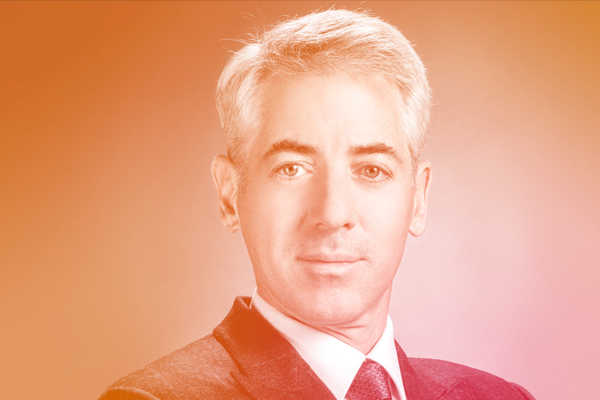
The world's most famous short seller is happy to leave the job of holding to account the market's frauds, pirates and charlatans to others.
Bill Ackman's recent performance has been spectacular and he is eyeing other prizes these days.
He is behind one of the world's biggest and for now, most mysterious, Special Purpose Acquisition Company vehicles, which are being tipped to circumvent the Wall Street fanfare of going public.
“The results have been great. And life is good. And I'm happy,” says Ackman, the headline act of the upcoming Sohn Hearts & Minds charity event, where the world's best investors share stock tips for charity.
Ahead of that appearance, the market is speculating, but not about which company Ackman will target with a forensic takedown.
“We really don't short stocks. It is not what we do for a living,” he says.
Rather it is which private business he might snap up with the $US4 billion ($5.6 billion) he raised via a Special Purpose Acquisition Company – with terminal business Bloomberg and accommodation disrupter Airbnb among those linked with an Ackman play that would effectively take them public.
In a Special Purpose Acquisition Company, a structure hardly used in Australia, an investor raises money for a so-called blank cheque company, retaining a portion of equity, with a certain time frame to purchase an asset.
For companies that want to go public, striking a deal with a SPAC is an alternative to an initial public offering. It saves time, money and some of the complications involved.
As an activist, Ackman is a divisive character on Wall Street.
He has rubbed executives the wrong way with extensive campaigns in which he’s taken both long and short positions, at times putting him in conflict with other investors.
The policemen of the marketplace are the people who do short research. Regulators clean up after the company melts down, after the fact.
— Bill Ackman
Ackman also has a nemesis of sorts in the form of Australian hedge fund manager John Hempton, who took the opposite bet on two of Ackman’s unsuccessful trades: a large position in Valeant, and a short bet on Herbalife. Both went badly wrong, wiping an estimated 30 per cent from his portfolio.
Ackman still disagrees with the Bronte Capital manager about Herbalife, and points to several regulatory issues that have since come to light which Ackman and his company Pershing drew attention to.
“Unfortunately it shows that a bad company can, with good lawyers and a good balance sheet, continue to exist.”
Ackman says he invented the activist short when he wrote a three-part series on a company called Farmer Mac almost 20 years ago which he described as an “effective, and positive experience”.
Now they are more common, which he believes is healthy for markets in striving to keep companies honest.
Short activists typically seek to expose overvalued or fraudulent companies via research reports that they make public in the hope of encouraging investors to sell or short shares in the company based on the findings. While most reports are authored by funds or known analysts, occasionally they are published anonymously.
“The policemen of the marketplace are the people who do short research,” Ackman agrees. “Regulators clean up after the company melts down, after the fact."
He referenced the Wirecard disaster in Germany, which evaded the scrutiny of regulators for years, before imploding in spectacular fashion. Its former chief operating officer is still on the run, and in the meantime, regulators, brokers and amateur investors had waged a campaign of intimidation on the Financial Times' investigative reporting.
"If you look at the Wirecard situation in Europe the regulator went after not just the short sellers but the Financial Times," Ackman says, alluding to the injustice of the situation.
But Ackman says there’s a darker aspect to short research too: “There’s a lot of Mickey Mouse stuff that happens that is totally inappropriate. There are cases where companies are materially harmed and it turns out the short sellers are wrong”.
Short reports are often fronts for more powerful or just less transparent forces, he says. Sometimes the authors are quietly backed by hedge funds who have put on a trade or compensate research firms for their work. Hedge funds also hand off their own work to others to publish anonymously.
“That raises a whole bunch of interesting regulatory issues.”
He says he understands why short reports are authored anonymously: “You get attacked and come under all kinds of scrutiny. Is one better off just doing the work and putting it out anonymously?”
However, Ackman and Pershing are no strangers to confrontation. He is probably Wall Street's most recognisable agitator, naming names and putting his claims on the record.
Ackman says his Herbalife trade was a one-off consumer protection play, and he did attract a lot of publicity to a company he believed to be "a pyramid scheme”.
His first big scalp was MBIA. In 2007, after a years-long campaign, he was finally vindicated. MBIA would buckle during the sub-prime mortgage crisis, and its triple-A rating which Ackman jousted with the ratings agencies over proved worthless.
Today, with his mysterious SPAC in the wings, perhaps Ackman has outgrown punishing short activism.
He says it could be because he’s turned 50 or because he’s remarried and become a father again, but his energy is focused on finding “great companies with great management teams” or “bringing in new management talent” by being an activist long investor.
“I respect short sellers but you don’t make a lot of friends in the short-selling business. It requires a very thick skin.”
Other investors that have joined Ackman on his short crusades have also found the animosity can come at the expense of returns.
Guy Spier, who initially embraced the rough and tumble of short selling, also turned his back on activist short selling after also betting against Farmer Mac.
It was Ackman who convinced Spier to turn a long position in Farmer Mac into a short, solidified after an evasive meeting with executives.
But his short bets against government-sponsored entities attracted the attention of then attorney-general Eliot Spitzer. Spier turned his back on short activism even though the facts vindicated the research.
“My goal as an investor is to compound money for my shareholders, not to pick unnecessary fights or conduct myself like an avenging moral crusader,” Spier wrote in his book Education of a Value Investor.
Therein lies the dilemma of the sceptical analyst. To steer clear of conflict and focus on investor funds or act on what they believe is in the public interest and bring corporate malfeasance to light.
“As I see it life is just too short for this sort of conflict and these investment gains didn’t justify the headache,” Spier said. “In my experience, it's karmically better to focus on the positive . . . instead of getting embroiled in acrimonious battles.”
The Herbalife short was one of two major forced errors that cost Ackman and his investors.
His other major misstep was Valeant Pharmaceuticals. The Canadian drugmaker once a market darling, memorably fell 50 per cent in a single session following an earnings restatement in a string of controversies relating to its accounting methods and relationship with specialty pharmacies.
He says the mistake from both was that he deviated from the core principles of his investment strategy.
While Ackman may have sworn himself off short selling, earlier this year he nailed his big short in the form of a complex credit derivative position in the eye of March’s pandemic storm.
In February, Ackman effectively took a bet that the credit market would crater through buying insurance on an index of derivatives tied to corporate debt. His fund was effectively on the hook to make $500 million of premium payments a year.
In the end, given the short duration of the trade, he paid $27 million of premiums but bagged a $US2.6 billion profit as credit spreads spiked.
“It was one of the most asymmetric low downside, big upside situations I've ever seen but there's nothing without risk.”
Ackman said it was a low-risk trade because he did not intend to keep it for long, and would know within a short time frame whether their view on the virus was right or wrong.
“That's what created the asymmetry. I could not conceive of a scenario in which a virus spreading around the world would cause people to be more comfortable about buying corporate credit.”
That index trade delivered a 39 per cent return for investors. That along with investments in Chipotle, Restaurant Brands International, Starbucks and Lowes helped Pershing to a 56 per cent gain this year, following a 58 per cent return the previous year.
Those disasters now seem a distant memory.
This article was originally posted on The Australian Financial Review here.
Licensed by Copyright Agency. You must not copy this work without permission.


In yet another fantastic episode with Equity Mates, first-time conference manager Qiao Ma chats with the guys about her incredible first investment, the investment philosophy of core manager Cooper Investors and the investment thesis behind her conference pitch, Shenzhou International.


NYU Stern School of Business Professor, serial entrepreneur and business podcaster Scott Galloway has blasted “sociopathic” big tech and the US government, while outlining the profound implications of COVID-19 for the US economy and its big players.


Australian investors will be very familiar with potential gains that can be created from innovations in the payment system, think Afterpay. In China, the mobile payments market is both enormous and advanced in technical terms, that’s where Yeahka Ltd operates — a top stock choice from Beeneet Kothari of New York-based Tekne Capital Management at the SOHN Hearts & Minds Investment Conference 2020.


Leading US fund manager Bill Ackman has predicted that 2021 will be a “very good” year for the US sharemarket, with a combination of low interest rates, fiscal stimulus and a new president who will not introduce radical policies.


The rise of telehealth and online medicine as a result of the COVID-19 pandemic has been behind the recommendation of New York based fund manager Cathie Wood, for US based telemedicine and virtual health care company Teladoc Health as her stock pick for the 2020 Australian Sohn Hearts & Minds Investment Conference.


When Bill Ackman realised coronavirus was about to run rife in the West he knew he had to do something fast to protect the $US10bn ($14bn) of assets managed by Pershing Square, much of it in restaurant brands that were vulnerable to the economic lockdowns he saw coming. Rather than sell stock, he opted to hedge via credit default swaps.


Halpert's “digital decolonisation” thesis is that entrepreneurs, companies, governments and consumers in developing markets are reclaiming their digital economies and ecosystems from multinationals, and developing indigenous solutions for local problems.


Billionaire investor Bill Ackman bemoaned his losing bet on Warren Buffett’s Berkshire Hathaway during a virtual appearance at the Sohn Hearts & Minds investment conference this week, according to the Australian Financial Review.


Bill Ackman predicts 2021 will be a rewarding year for the equity market and urged investors to "go long", but the Wall Street legend and Pershing Square founder worries that irrespective of Pfizer's vaccine breakthrough, the US faces a grim winter of coronavirus casualties.


Global stocks exposed to the technology boom, whose performance was partially fuelled by the coronavirus crisis, were the big winners from the calls made by top investment minds at the Sohn Hearts & Minds Investment Conference last year.


Leading US fund manager Bill Ackman has predicted that 2021 will be a “very good” year for the US sharemarket, with a combination of low interest rates, fiscal stimulus and a new president who will not introduce radical policies.


Online retail stocks have become the small cap investment story of 2020, according to Todd Guyot, a portfolio manager with Regal’s $320m Australian Small Companies Fund. “We have done well out of the whole online theme of late,” says Guyot, who will be tipping a stock at the fifth annual Sohn Hearts & Minds conference on Friday.


When Bill Ackman realised coronavirus was about to run rife in the West he knew he had to do something fast to protect the $US10bn ($14bn) of assets managed by Pershing Square, much of it in restaurant brands that were vulnerable to the economic lockdowns he saw coming. Rather than sell stock, he opted to hedge via credit default swaps.


Tekne Capital Management portfolio manager Beeneet Kothari says US technology stocks continue to look attractive given their strong earnings outlook and dominant positioning in what he sees as a multi-decade reshaping of economies and business fuelled by COVID-19.


The shock suspension of the Ant Group initial public offering, slated to be the biggest float in history, has left investors reeling, but it could be back up and running within weeks, according to Tribeca Investment Partners’ Jun Bei Liu.


US tech giants are on track: not just to soar through the pandemic, but to structurally lock in their competitive edge well beyond COVID-19. What is more, there will be a tsunami of reallocated capital across the economy, creating huge winners and losers that investors should get ahead of if they don’t want to miss out.


One of the fiercest critics of 'Big Tech', author and academic Scott Galloway, has admitted his bearish call on Afterpay was wrong and warned that America's internet giants are poised to consolidate power following the coronavirus pandemic.


Scott Galloway, outspoken academic and expert on big tech, says "Jedi mind tricks" and "consensual hallucination" are responsible for some huge market valuations, and warns Silicon Valley giants will entrench their dominance in the post-pandemic world.


It has gone down in Wall Street folklore as one of the greatest trades in history – a $US27 million ($37.8 million) bet during the market meltdown in March that returned $US2.6 billion in the space of three weeks. And the mastermind behind it, New York hedge fund titan Bill Ackman, is now bracing for another bout of turbulence.


Wall Street legend Bill Ackman says megacap stocks such as Starbucks will come out of COVID-19 with a bigger moat and a market dominance like never before, and no election outcome will make a difference to the plight of wrecked small businesses.


A little under a year ago, Cathie Wood named Tesla as her top stock pick for 2020. Speaking at the Sohn Hearts & Minds Investment Leaders Conference in Sydney last November, Ms Wood, who runs US technology-focused investment firm Ark Invest, said her bearish case was that the stock price would double by 2024. It hit that milestone less than three months later.


Rory Lucas may have one of the best jobs in finance. As the chief investment officer of Hearts & Minds Investments (HM1), it's his duty to oversee the $780 million portfolio of the best ideas from some of the world's top investors.


Legendary Wall Street investor Bill Ackman will headline the 2020 Sohn Hearts & Minds investment leaders conference this year in a major coup for the event that has raised more than $20 million dollars for medical research since its inception in 2016.